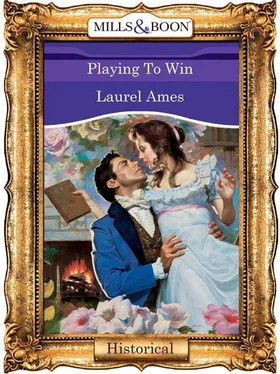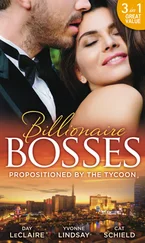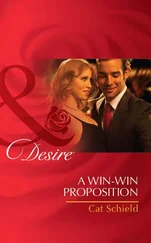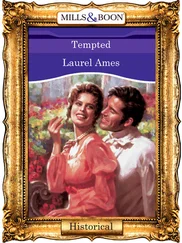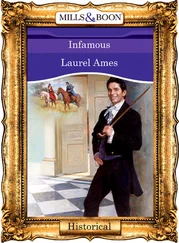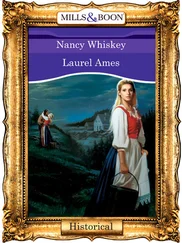“I must leave now,” vowed Lady Amanda.
“Certainly not,” said Sera, shaky, but more composed than either Tony or Lady Amanda. “To be sure, he will have forgotten all about it by tomorrow. He is most angry when he knows he is in the wrong, and he will do something nice for us by way of apology.”
“But that is just what Edwin was like.”
“Perhaps Tony is only imitating him, then.”
“I hope not,” Lady Amanda said, and Sera was afraid to ask her what she meant. But if his mother was outraged at Tony’s behavior, then it was not her imagination that their marriage was a strange one. Others might think so, too, especially if Tony seemed once again on intimate terms with Madeleine Vonne. Sera could abandon him, of course. She had enough money to live by herself wherever she chose, even to take Lady Amanda with her. It was the thought of this, rather than Tony’s sad lapse, that left her sobbing into her pillow that night. She did love him. Reso- lutely she dried her eyes. She must make a push to win him, then, or at least keep him so distracted he had no time for Madeleine.
* * *
Sera did not miss Chadwick for a day or two. If she had asked Tony where her groom had gone, he might have shyly said that he had sent him after Tansy. But she did not ask, and Tony did not volunteer the information. If Chadwick could not get the horse back, there was no point in getting Sera’s hopes up.
Sera had returned to her calm and normal self the next day. She was not at all like Lady Vonne, who would never have let such a quarrel die until she had Tony at her feet. Moreover, Sera seemed to have forgotten all about the horse, and Tony had begun to wonder if he had been hasty in sending Chadwick off after it.
Tony had from the first morning read The Times at breakfast, Sera suspected to avoid conversation. In the absence of Lady Amanda, who lately preferred to breakfast in bed, Sera carried on a monologue that frequently tried the reserve of the butler, Rayburn, who was not supposed to be attending to the conversation.
“It says here that Lord Haye spoke in Parliament yesterday,” she pretended to read from the Morning Post, “on the abolition of war...and the prohibition of all hunting in Hampshire...and the Midlands,” she added, failing to get a rise out of Tony.
Rayburn overset a teacup, which did make Tony look up.
“That’s where you hunted last year, isn’t it? In the Midlands?”
“Mmm...” Tony grunted.
Sera smiled sweetly at Rayburn, who staunchly froze his face.
“In the society news,” she continued, “it seems that lapdogs are on the decline. At least three well-bred ladies of fashion have taken monkeys as pets. Do you think I should get one too, Tony?”
“Yes, if you like.” The Times trembled, but Sera only thought Tony was turning a page.
Rayburn ineffectually tried to cover a guffaw with a cough.
“Are you ill?” Tony inquired acidly of the dignified, gray-haired retainer.
“No, m’lord.”
“Yes, I do think a monkey would be so particularly entertaining at the breakfast table, don’t you?”
“Yes, of course,” Tony said, as deadpan as he could manage.
“Although one really can’t do much with a monkey other than feed him. Perhaps I shall buy myself a horse instead. If you do not have time to go to the sales with me, Chadwick can go. He’s a good judge of horses, isn’t he?”
“What? Yes, of course,” Tony returned.
“Good. That’s all settled, then.” Sera smiled triumphantly at Rayburn, who beat a hasty retreat to the kitchen.
Without giving it much thought, Tony had supposed when he got married that he would be allowed to read his Times undisturbed at the breakfast table, as his father had done. He wondered now if perhaps his father’s predilection for solitary reading was what had encouraged his mother to babble.
After a late night of cards, Tony was not much in the mood for conversation, anyway. But when he discovered one day that his monosyllabic replies to Sera’s breakfast sallies had given her permission to turn the largest downstairs room into her personal library, he began to listen with a little more attention, even though he was too proud to let her know this.
If only she asked for something as simple as a new hat. He had frequently to bite his lip to keep from laughing outright at some of her more ridiculous flights of fantasy. Behind his paper, he could exercise more control than Rayburn, who had to face Sera and voice an occasional reply.
Fortunately, Sera talked herself out of her sillier proposals, like the monkey, for she was not really a spoiled child, as he had once supposed. She was an inordinately inventive young woman who only wanted the smallest part of his attention. That he could not give her even that disturbed him more than he liked to admit. But he had to keep her at arm’s length until he was free of his debt to her. Once she no longer owned him, he could be a proper husband to her. It was only after Sera had gotten bored with her game and left on her errands for the day that Tony actually ate or studied the financial news for the day.
He knew that Rayburn no longer looked kindly on him, because of his supposed mistreatment of Sera, and he did not blame the man. He did not like himself much for how he had chosen to handle his problem. But he was making some small progress toward his goal of financial independence, and Sera seemed patient enough in most other matters.
If she truly had no female friends her own age, it might not occur to her what an odd marriage they had. But then he thought of Marie and those sharp French eyes looking daggers at him. No telling what she might confide to Sera.
Not finding Chadwick about, Sera knew a chilling fear that Tony had dismissed him, and for a moment she forgot all about her plan. Jeffers merely said that Chadwick had been sent on an errand, and Sera was miffed. Tattersall’s sales were only held on Mondays at this time of year. If she did not get a horse today, she would have to wait a whole week.
“I know. You can go with me to buy a horse.”
“Me?” Jeffers asked.
“You’re the head groom. Tony said I could take Chadwick, but you must know as much about horses as him, perhaps more.”
“But Lord Cairnbrooke usually buys his own horses—”
“But this horse is for me. I feel sure you will be able to help me. Now saddle that ugly bay for me, and we’ll be on our way.”
“Where are we going?” asked Jeffers suspiciously as he sent the undergroom scurrying to saddle two horses.
“Tattersall’s.”
“But ladies don’t go there!” he blurted out.
“Well, I’m not going, of course—you are.”
“Why are you riding with me, then?”
“I want to try the horse out straightaway. We shall be near Hyde Park, anyway.”
When they reached Tattersall’s, Sera rode boldly into the courtyard and commanded a lounging groom to take her horse.
“But you said you were not coming,” Jeffers protested.
“Not to the sale, silly. That won’t start for an hour or more. I must at least look at what they have to know what I want.” She strode past the line of carriages under the portico and into the stables themselves. Jeffers looked about nervously, but there was no one to be seen except a few stable boys, who merely gawked at Sera as she wandered from one stall to another. She gave a blood chestnut a good deal of attention, commanding Jeffers to check the animal’s feet. This nearly got him kicked, and Sera spoke threateningly to the horse in a low, menacing voice that Jeffers could hardly credit as coming from her.
She had learned a trick or two in the theater, and was not above using them. The beast snapped to attention, as though he were trying to see where the new voice came from.
Читать дальше
